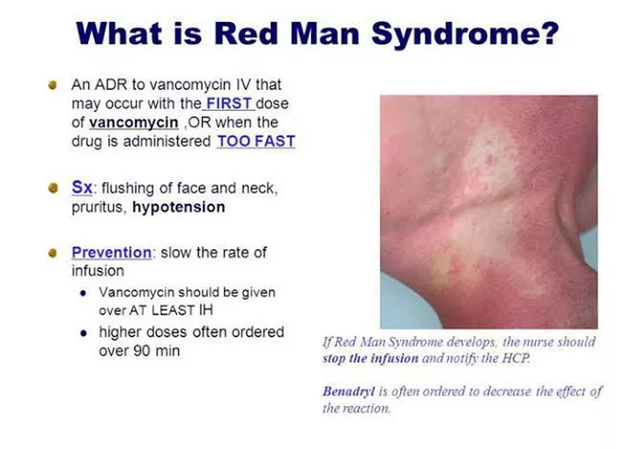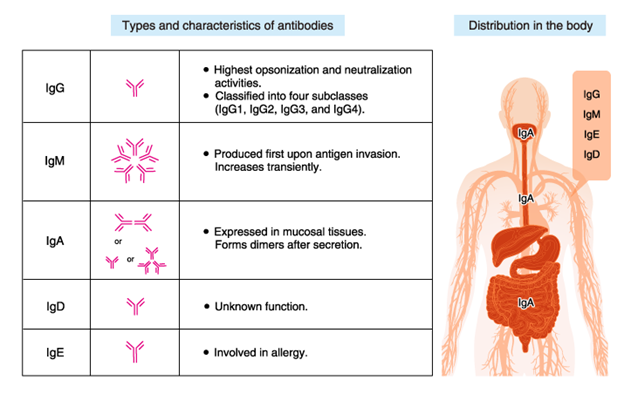The nurse is caring for a patient who is receiving vancomycin (Vancocin). The nurse notes that the patient is experiencing flushing, rash, pruritus, and urticaria. The patient's heart rate is 120 beats per minute, and the blood pressure is 92/57 mm Hg. The nurse understands that these findings are consistent with:
allergic reaction.
rhabdomyolysis.
Stevens-Johnson syndrome.
red man syndrome.
The Correct Answer is D
Allergic reaction: An allergic reaction can manifest in various ways, including rash, itching, and difficulty breathing. However, the specific symptoms described, along with the context of vancomycin administration, point to red man syndrome in this case.
Rhabdomyolysis: Rhabdomyolysis is a condition where damaged muscle tissue breaks down and releases a protein called myoglobin into the bloodstream. This can cause kidney damage, but the symptoms described do not align with rhabdomyolysis.
Stevens-Johnson syndrome: Stevens-Johnson syndrome is a severe skin reaction that can cause skin and mucous membranes to blister, peel, and can be life-threatening. While it can present with rash and other skin symptoms, the symptoms mentioned in the scenario are more characteristic of red man syndrome.
Red man syndrome: As mentioned earlier, red man syndrome is an allergic reaction to vancomycin characterized by flushing, rash, pruritus, and urticaria (hives), along with rapid heart rate and low blood pressure. It is specific to vancomycin and can be prevented or minimized by slowing down the infusion rate and administering antihistamines.

Nursing Test Bank
Naxlex Comprehensive Predictor Exams
Related Questions
Correct Answer is A
Explanation
A. IgE (Immunoglobulin E): This class of antibodies is primarily involved in hypersensitivity reactions Type I, which are immediate allergic reactions. When a person is exposed to an allergen they are sensitive to, IgE antibodies on the surface of mast cells and basophils bind to the allergen. This triggers the release of inflammatory mediators like histamine, leading to allergic symptoms such as itching, hives, and in severe cases, anaphylaxis.
B. IgA (Immunoglobulin A): IgA antibodies are primarily found in mucosal areas such as the respiratory and gastrointestinal tracts. They play a role in immune defense on mucosal surfaces and are important for preventing infections. While IgA is not directly associated with hypersensitivity reactions Type I, deficiencies in IgA can sometimes lead to increased susceptibility to certain infections.
C. IgG (Immunoglobulin G): IgG antibodies are the most common type of antibody in the bloodstream and are involved in various immune responses, including defense against bacterial and viral infections. IgG antibodies are not specific to Type I hypersensitivity reactions; they are part of the immune system's broader defense mechanisms.
D. IgM (Immunoglobulin M): IgM antibodies are the first antibodies to be produced in response to an infection. They are large pentameric molecules and are effective at agglutinating pathogens. IgM antibodies are involved in the primary immune response to infections, but they are not specifically associated with Type I hypersensitivity reactions.

Correct Answer is B
Explanation
A. Antibiotics are prescribed according to culture and sensitivity reports:
When antibiotics are prescribed based on specific tests like cultures and sensitivity reports, it ensures that the right antibiotic is chosen for the specific bacteria causing the infection. This practice helps in targeting the infection more effectively, reducing the risk of antibiotic resistance.
B. Patients stop taking an antibiotic after they feel better:
This scenario is problematic. When patients start feeling better, they might assume the infection is completely gone and stop taking antibiotics before the prescribed course is finished. This premature discontinuation can leave some bacteria alive, which may develop resistance to the antibiotic used. This practice is a significant contributor to antibiotic resistance.
C. Antibiotics are taken with ascorbic acid (vitamin C):
Ascorbic acid (vitamin C) doesn't have a significant impact on antibiotic resistance. It is not a factor contributing to antibiotic resistance.
D. Antibiotics are taken with water or juice:
Whether antibiotics are taken with water or juice doesn’t directly influence antibiotic resistance. Proper hydration is essential to support the body's overall health, but it doesn't impact the development of antibiotic resistance.
Whether you are a student looking to ace your exams or a practicing nurse seeking to enhance your expertise , our nursing education contents will empower you with the confidence and competence to make a difference in the lives of patients and become a respected leader in the healthcare field.
Visit Naxlex, invest in your future and unlock endless possibilities with our unparalleled nursing education contents today
Report Wrong Answer on the Current Question
Do you disagree with the answer? If yes, what is your expected answer? Explain.
Kindly be descriptive with the issue you are facing.
